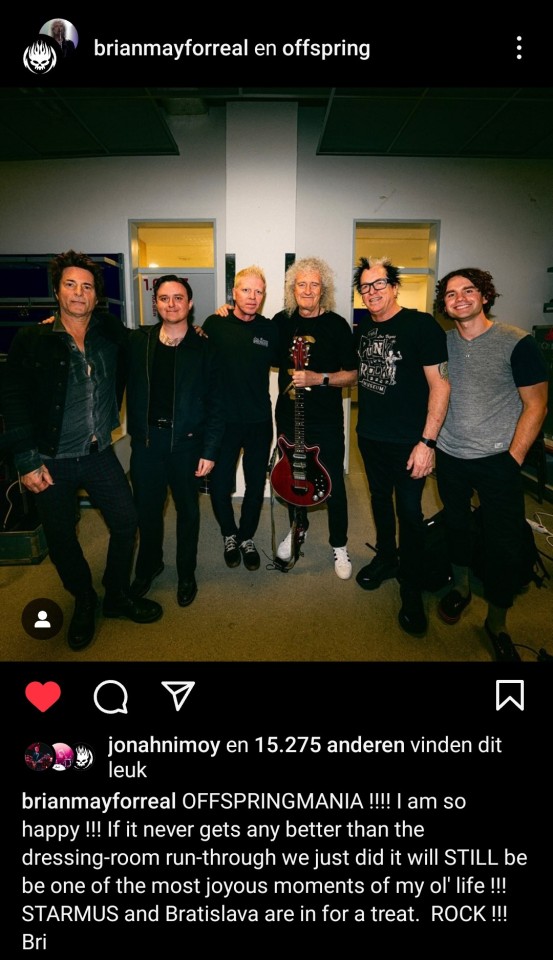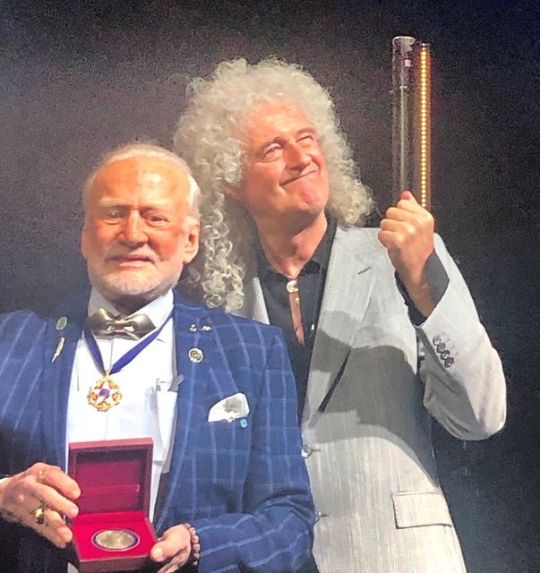#starmus festival
Explore tagged Tumblr posts
Text

🥺
#This is the cutest thing#Where is the footage Bri????#The offspring#Brian may#Starmus festival#Queen#Dexter Holland#Noodles#Jonah Nimoy#Brandon Pertzborn#Todd Morse#Ilu Dr Dex <3
9 notes
·
View notes
Photo

On July 1st, 2016, Sarah performed at the "Sonic Universe Concert" as part of the Starmus Festival III, at the Auditorio de Tenerife Adán Martín, in Santa Cruz de Tenerife, Canary Islands, Spain. Sarah performed an abridged version of her Dreamchaser concert, and was joined by tenor Mario Frangoulis, and the Tenerife Symphony Orchestra conducted by Paul Bateman. Attendees and honorees included Hans Zimmer, Chris Hadfield, Stephen Hawking, and Brian May.
0 notes
Text

An award he was given for science education from the Starmus Festival, much to the delight of that guy behind him. (Brian May)
And from the Starmus website:
“Buzz is the author of 9 books, most recently his children’s book, Welcome to Mars: Making a Home on the Red Planet and his newest NY Times and Washington Post Bestseller, “No Dream Is Too High: Life Lessons from a Man Who Walked on the Moon”. Both published by National Geographic.
In October of 2014 he revamped his ShareSpace Foundation to be focused on STEAM Education - Science, Technology, Engineering, Arts and Math to ignite the spark and fuel excitement for space in kids –Specifically for K-8. In August of 2015 he launched the Buzz Aldrin Space Institute at Florida Tech to promote and develop his vision of a permanent human settlement on the planet Mars.”
@nsomniacsdream
22 notes
·
View notes
Text
The assassination attempt on Robert Fico left the country, as well as the rest of Europe, in shock. While the PM is now back at home recuperating, the country ponders difficult questions about its future.
In the heat of a late May afternoon, Bratislava is awash with blooming perennial flowers as well as tourists and locals enjoying the start of summer. At first glance, you’d never guess anything with Slovakia was amiss. Business is booming, the streets are littered with billboards and slogans promoting the upcoming EU elections, and the city has just hosted the famous Starmus science festival starring Brian May and more than a dozen Nobel prize winners. And yet Slovakia has been the scene of not one, but now three traumatic, tragic attacks in recent years, highlighting the depth of the polarisation and conflict that is rending society.
In 2018, young investigative reporter Jan Kuciak and his fiancée Martina Kusnirova were ruthlessly gunned down in their own home in the village of Velka Maca. Four years later, a radicalised young man carried out the first terrorist attack in Slovak history in front of a queer bar in Bratislava, killing two and wounding a third. And three weeks ago, the widespread hate and polarisation culminated in the first serious attack on a politician.
This time a gunman chose the highest target, Prime Minister Robert Fico, who had returned to power only last October. He was shot multiple times at close range. Rushed to hospital in Banska Bystrica, he underwent six hours of surgery. Last week he was released to home care to start his rehabilitation, but is yet to address the public.
In the hours and days after the shooting, politicians, experts and media from across the spectrum called for a calming of emotions, for peace, and for people to take a moment to reflect.
In a rare sign of unity, outgoing President Zuzana Caputova and President-elect Peter Pellegrini stood side by side, inviting all the leaders of parliamentary parties for a round table to figure out how to move forward. These efforts, unfortunately, never materialised after two coalition parties, Fico’s Smer and the far-right Slovak National Party (SNS), refused to attend. Instead, the government proposed a joint resolution denouncing the attack in the parliament, which all of the parties unanimously adopted.
Breaking point
While the government proclaims its attempts at “reconciliation” and the fight against hate at every opportunity, many observers see anything but.
Instead of open discussion with their political rivals, government officials opt for blaming the critical media or opposition for creating the fevered atmosphere that led to the shooting, basing their claims on the motives of the shooter, who was reportedly reacting to some of the steps taken by Fico’s government since it came to power in October – the changes at the public service broadcaster and the Judicial Council or the dissolution of the Special Prosecutor’s Office.
The shooter reportedly had also attended some of the anti-government protests organised by the opposition. On the other hand, he also published anti-Roma pamphlets and was close to the pro-Russian paramilitary group Slovenski branci in the past, too.
“Of course, it’s not reconciliation [the government] is after. They don’t need to reconcile with anyone, they need to seize control of the country. And they really need the other side to be silent. They need civil society to start being silent,” says Michal Vasecka, a sociologist at the Bratislava Policy Institute.
And in that they could be succeeding. “One part of society has been completely paralysed [after the shooting], and I think it will stay paralysed for a long time. And the other part will be even more aggressive and uncompromising. It is definitely at a breaking point,” adds Vasecka.
Despite different reactions to the tragic shooting on the square in Handlova, Slovak political leaders as well as analysts agreed that Fico was the target of an “attack on democracy” at its core. And according to political analysts, it is indeed the country’s democracy that will be hurt most by this attack, along with the premier.
Aftermath of the shooting
In the short term, the assassination attempt on the prime minister is very likely to influence the results of the June 8 EU election in Slovakia. The situation will probably work in the favour of Fico’s Smer party, whose candidates are already using the tragic event heavily in their campaign.
“The elaborations of the liberal camp may have led to the liquidation of Robert Fico, because Smer has no future without him,” said Smer’s most radical MP, Lubos Blaha, at a pre-election meeting in Orava region, according to Postoj.sk.
Blaha said government officials are, in fact, only defending their rights. “Who started this hate? Who said that we were killers, mafiosos, thieves? Remember that! They banned the alternative websites, took our freedom of speech. We must tidy them up in a sense that there needs to be normal discussions,” he continued, according to Postoj.
The EU election in Slovakia is set to be mainly a battle between two leading parties: the leftist Smer and liberal Progressive Slovakia (PS), which dominated the last EU elections in 2019.
Meanwhile, the government’s idea of a “normal discussion” has become reality on many TV channels. By the end of May, almost all free political debate shows in the Slovak television landscape have lost their hosts, or have been cancelled completely, the latest victim being the most watched political TV show in Slovakia, Na telo on TV Markiza.
TV Markiza, owned by the PPF investment group run by the Kellner family of the Czech Republic, cancelled the program after Michal Kovacic, an award-winning host ended the latest episode with a speech describing the “Orbanisation” of Slovakia’s media, referring to the state of the independent media in next-door Hungary after 15 years of Viktor Orban in power – under extreme pressure from the government as well as from their own managements.
Over a hundred reporters at TV Markiza have since signed a public letter to the management, standing behind Kovacic and Na telo. Similar to employees at public service broadcaster RTVS a few weeks ago, all Markiza reporters appeared in a live broadcast wearing black and announced a strike.
More of the same, but stronger
Pavol Hardos, political scientist at Comenius University in Bratislava, says that the assassination attempt will only strengthen a trend of weakening democratic norms that was already in motion. “The scenario had already been set and the only thing this assassination will do is accelerate this development and make the opposition’s work even harder,” he says.
While information on Fico’s medical condition remains sparse and mostly reduced to a “gradual improvement of his health condition��, the cabinet powers on to prove to the world that it’s business as usual and the bullets will not slow down their efforts to remake the country’s institutions.
In the two weeks since the shooting, the Slovak government has managed to push for a drastic change in the management of the Slovak Arts Council, effectively stripping it of its independence; sent the highly controversial and widely criticised bill that will drastically alter the Slovak public broadcaster to its second reading; proposed a change in the Freedom of Information Act that would turn public information into a paid service; and proposed a series of stricter media laws, potentially limiting freedom of speech and the media.
“I think we can expect more of the same, but at a much stronger pace. The line that the government might have planned or signalled before, but could have been met with resistance, will now be pushed all the more vehemently and openly,” reckons Hardos.
“The assassination attempt will become a tool that will allow them to blame their future victims for bringing this upon themselves,” he adds, explaining that a free media, the civil sector and the opposition will invariably be the first victims of this development.
Michal Vasecka thinks the government’s highest priority has been to take full control of the security forces. “The powers that be are trying to deal with anyone that might become a problem,” he says, citing the example of the prosecution of the so-called “Curillovci”, a group of police investigators that had successfully uncovered high-level corruption in recent years but who are now facing criminal charges themselves.
Earlier this year, the government dismantled the Special Prosecutor’s Office, which was responsible for prosecuting the most serious crimes and corruption. At the same time, it drastically changed the criminal code to bring in lower penalties for corruption (currently under review by the Constitutional Court) and proposed stripping the National Criminal Agency of its powers to go after corruption at all.
Paving the road to autocracy
Vasecka goes further, believing that Slovakia as a state has descended into unchartered territory over the past decade or more. “Right now, we are not talking about political polarisation here, it is far worse. Slovakia is finding itself in a kind of cognitive chaos, a fall into a very deep anomie [a social condition defined by a breakdown of moral values, standards or guidance for individuals to follow], a destruction of a normative system of society,” he says.
“The rules of the game don’t apply anymore. There is huge distrust in society: people don’t trust each other, don’t trust the institutions, the future. There is a huge degree of cynicism,” he adds.
In this atmosphere, radical or irrational actions might not come as such a shock anymore. “In anomie times, when the normal rules don’t apply anymore, anything is possible,” says Vasecka.
According to research by the MEDIAN agency from the end of 2023, only 26 per cent of people in Slovakia trusted the government, even less (23 per cent) trusted the courts, and only 16 per cent professed trust in the parliament.
This lack of trust was a feature in the 2024 GLOBSEC Trends report, which found that only 38 per cent in Slovakia were satisfied with the state of democracy in their country. While trust in government had grown from 18 per cent in last year’s survey to 39 per cent in 2024, 36 per cent of respondents said they would welcome a totalitarian system without regular elections.
Experts describe a series of steps taking Slovak democracy further and further away from the Western or liberal standard: silencing the critical media, paralysing the opposition, dissolving standard principles of lawmaking, threatening NGOs, controlling once-independent institutions, attempting to change the election system. “After all that, politics might still be free, but it won’t be fair anymore. The competition will be set to only benefit the ruling power,” says Hardos.
“All of the conditions for setting a soft autocracy have been met: the public opinion that basically asks for autocracy, determined people who are ready to do it, the civil society unable to defend itself, some parameters of international affairs,” says Vasecka.
1 note
·
View note
Text
youtube
The Offspring - "Gone Away" live w/ Brian May of Queen at STARMUS Festival 2024
Jul 26, 2024
"Gone Away" live w/ Brian May of Queen at STARMUS Festival in Bratislava, Slovakia on May 15, 2024.
ABOUT STARMUS: Created by Garik Israelian, PhD in astrophysics, and legendary Queen guitarist and PhD in astrophysics, Brian May,Starmus is considered the most ambitious science and music festival in the world. Starmus main mission is to bring science, space and the stars closer to the general public by inspiring the next generation of scientists and explorers.
Founded in 2011 and after 7 epic editions in different parts of the world, Starmus is the only global event that manages to bring together under the same roof a large number of Nobel laureates; the great heroes and visionaries of the space race - such as the Apollo astronauts - and world-class scientists, engineers and researchers to deliver the most inspiring debates on the great questions of our time.
Learn more at: https://www.starmus.com
New album SUPERCHARGED out October 11th! Pre-Order/pre-save now at: https://found.ee/OffspringSUPERCHARGED
from The Offspring
0 notes
Text
Starmus returns to the Canary Islands for ‘Starmus La Palma’ in April 2025
Tenerife/La Palma – June 18, 2024 — STARMUS, the most ambitious science and music festival — founded by Garik Israelian, PhD in astrophysics and the Queen guitarist Brian May, also a PhD in astrophysics — announced today its next edition to be held on the island of La Palma next April 2025. At a pressContinue reading “Starmus returns to the Canary Islands for ‘Starmus La Palma’ in April 2025” The…
View On WordPress
0 notes
Link
Jean-Michel Jarre & Brian May Perform Together at Starmus Festival-Jean-Michel Jarre and special guest Brian May from Queen electrified an audience of 100,000 fans on May 12 gathered in Bratislava, Slovakia, on Sunday (May 12) at Bridge from the Future, the opening concert for the Starmus Festival, presented in association...
0 notes
Text
Jean-Michel Jarre Live At STARMUS Festival, With Brian May Of Queen
https://www.synthtopia.com/content/2024/05/12/jean-michel-jarre-live-at-starmus-festival-with-brian-may-of-queen/?utm_source=dlvr.it&utm_medium=tumblr
0 notes
Text
Jean-Michel Jarre with Brian May - Starmus Festival
Jean-Michel Jarre with Brian May - Starmus Festival The French synth pioneer who has been in the Guinness world records several times for World's biggest concert opened the Starmus Festival in Slovakia yesterday and featured Queen guitarist Brian May.https://www.youtube.com/watch?v=GzjG95rB96Q&t=15s Submitted May 13, 2024 at 03:15AM by MrDopple68 https://ift.tt/W0FEbsG via /r/Music
1 note
·
View note
Text

ICYMI: Jean-Michel Jarre announces concert with Brian May at Starmus Festival - #jeanmicheljarre @jeanmicheljarre http://dlvr.it/T5RPcz
0 notes
Text

ICYMI: Jean-Michel Jarre announces concert with Brian May at Starmus Festival - #jeanmicheljarre @jeanmicheljarre http://dlvr.it/T5RLXX
0 notes
Photo

On July 1st, 2016, Sarah performed at the "Sonic Universe Concert" as part of the Starmus Festival III, at the Auditorio de Tenerife Adán Martín, in Santa Cruz de Tenerife, Canary Islands, Spain. Sarah performed an abridged version of her Dreamchaser concert, and was joined by tenor Mario Frangoulis, and the Tenerife Symphony Orchestra conducted by Paul Bateman. Attendees and honorees included Hans Zimmer, Chris Hadfield, Stephen Hawking, and Brian May.
0 notes
Link
0 notes
Text

20 June 2017 | Neil de Grasse Tyson greets Haakon, Crown Prince of Norway during the Starmus Festival in Trondheim, Norway. (c) Michael Campanella/Getty Images
0 notes
Audio
The Moment She Knew by Nosound from the live album Teide 2390
#music#italian music#kscope#nosound#giancarlo erra#alessandro luci#giulio caneponi#marco bemi#alex cherney#alessandro pagliaccia#paolo vigliarolo#live#live music#teide#teide observatorium#moisés gonzàlez#starmus festival#tenerife
15 notes
·
View notes
Text
instagram
Well fuck me.
39 notes
·
View notes